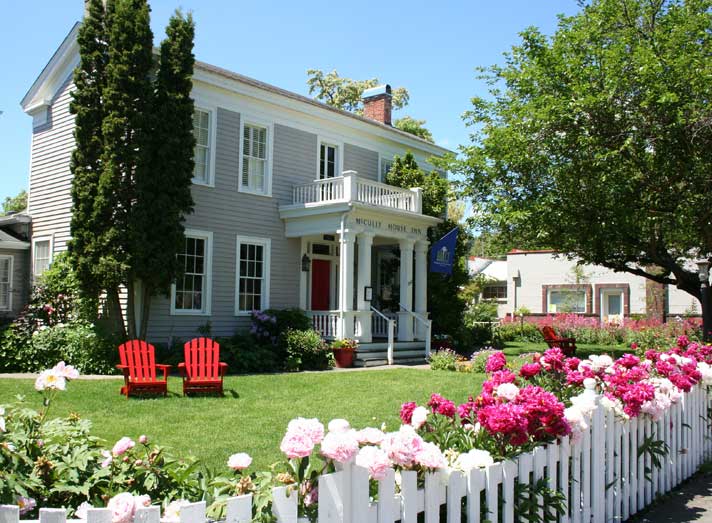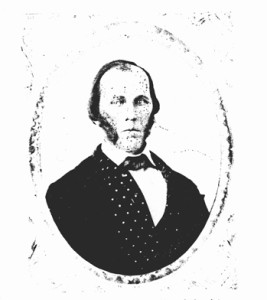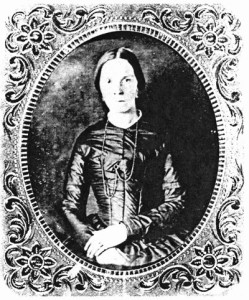Pioneer Profiles – July 2016
The story of Jane and John McCully appears to have been one of opposites attracting. Jane has been described as “courageous, valiant, dauntless, adventuresome, and plucky”—worthy virtues for a pioneer lady and perhaps a partial reflection of her Scottish heritage. She was born in 1824 in Alloway, Scotland, home to the Scottish poet Robert Burns. When she was 11, she immigrated with her family to America where they settled first in New York, then in Indiana, and eventually in Iowa. Jane was well-educated, and was teaching school when she met John.
John Wilmer McCully was born in 1821 in St. George, New Brunswick, Canada. When he was one-year-old, his family moved to Ohio where John grew up. He too was well-educated. When he moved with his family to Iowa in 1844, he attended medical school and joined the practice of an established local doctor. John was well-mannered-—even gallant—but also sensitive and indecisive.
Jane may have mistaken the latter trait for shyness and enjoyed the “spice” of their contrasting personalities. With education and ambition in common, they married in 1848. He was 27; she was 24.
Even before the discovery of gold in 1849, people were fascinated by the western frontier. Gold and its promised riches added to the lure. John may have had some reasonable fears about the unknown along with a reluctance to leave a growing medical practice, but Jane apparently overcame any objections and provided the needed optimism. In 1851 they joined a wagon train that included two of John’s brothers and started across the plains, arriving in Oregon in the fall of that year. John’s brothers continued on to California, but with winter near at hand, and money and supplies exhausted, John and Jane stopped in Salem.
Since they didn’t plan to stay, John saw little point in opening a practice. Jane took the reins, teaching in a private school to support them through the winter and to acquire a little savings. When gold was discovered in Rich Gulch that winter, the McCullys joined the exodus of miners and fortune-seekers heading to Southern Oregon.
When the McCullys arrived in Table Rock City (Jacksonville) in the spring of 1852, Jane was one of two “respectable females” in the newly-established gold mining town of tents, shacks, a few cabins, a trading post, and dozens of saloons. The McCullys moved into a cabin not far from the center of town on property where they would later build a permanent home.
John hung out his shingle, but there was little demand for a doctor. The miners were used to enduring pain and discomfort. Jane couldn’t fall back on teaching. Even with the arrival of another family, there were no children to be taught. But Jane again showed she could be relied upon in a financial crisis, tapping another one of her skills.
Jane baked. She baked bread, cakes, and pies which she sold for one dollar each. Since most miners’ diets consisted of beans and bacon, they eagerly bought everything she could produce. Almost overnight, Jane had a thriving business.
The next few years saw an influx of settlers, Table Rock City became Jacksonville, and John’s medical practice was finally in demand. The couple began to prosper along with the town. Their son, James Cluggage McCully, was born, named after one of the town founders. The baby was the center of attention, and every miner in the region considered himself a godfather. “The graceless little scamp was so spoiled it required years of Sunday school to straighten him out.”
Soon thereafter, John began dabbling in real estate. He purchased land in Jacksonville and became part owner of the El Dorado saloon and a local dairy. Having been indecisive and timid for so long, he suddenly blossomed out as a “bold speculator.” Although Jane may have advised caution, John apparently decided that his subservient days were over—he would prove to Jane that he could be self-reliant, confident, and successful. He would be a man of property that she could be proud of, an entrepreneur.
John mortgaged their city lot to build the most costly structure in town—the two-story brick building at the corner of Main and South Oregon streets that now houses the Odd Fellows Hall. Upon its completion in 1857, he rented the lower floor as a retail establishment. The upper floor, known as McCully Hall, was designed as an auditorium for traveling performers. Over the next two years, many dramatic companies appeared in McCully Hall. It was also used for civic activities, and it served the local Jewish population as a synagogue.
The building had cost a fortune and John was deeply in debt, but he was confident the investment would prove profitable. He only wished he had made it larger so it could bring in more revenue.
The same year McCully Hall was completed, the family’s second child, Mary (known as Molly) was born, and John was elected to the Territorial Legislature, the only Republican from Jackson County.
John now apparently considered himself someone to be reckoned with—he was the head of an admirable family, the owner of impressive real estate holdings, and a member of the Legislature. It would only be fitting for him to build a handsome new house to symbolize his affluence and prominence.
Although he must have known his financial position was precarious—there were already a number of liens attached to McCully Hall—the idea of a grand house that would be the envy of the town was too good to resist. Construction of what’s now known as the McCully House began, John paying his creditors with promises.
Shortly before the house was finished, a third child, Isadora, was born in December 1859. Then with the family’s move into their new home, John must have felt that his image as a man of stature was complete.
However, John’s creditors were neither impressed nor forgiving. Between the McCully building and the McCully House, claims against John exceeded $7,500. There was no way he could meet the payment demands. He was about to lose his land, his business interests, and his reputation.
That winter, John McCully took the stagecoach out of town. Jacksonville never saw him again, and Jane McCully was left with three small children and all of his debts.
Next month: The McCullys—The Next Chapter….
Pioneer Profiles is a project of Historic Jacksonville, Inc. Visit us at www.historicjacksonville.org and follow us on Facebook (historicjville) for upcoming events and more Jacksonville history.


